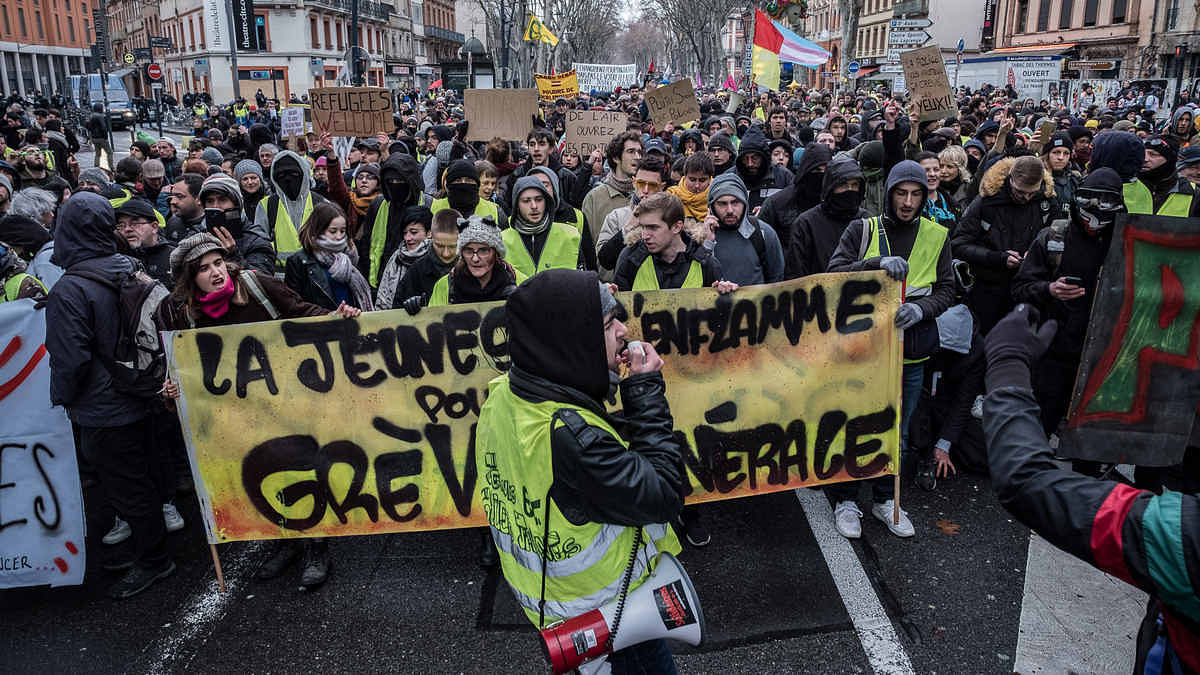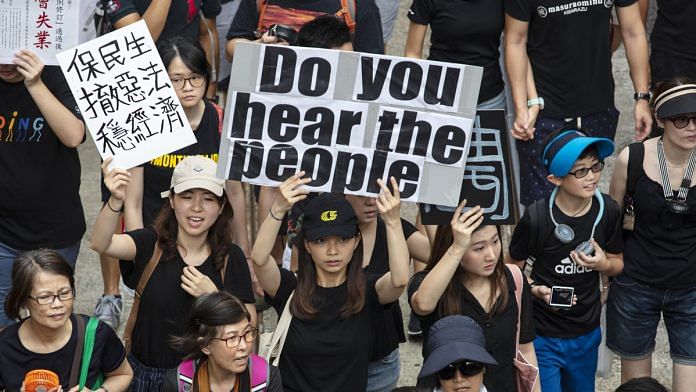London: Hong Kong martial arts guru Bruce Lee urged followers to “empty your mind, be formless, shapeless like water.”
That philosophy has driven months of anti-government unrest in Hong Kong. And it applies to protest movements elsewhere that are operating with quick-changing tactics and without clear leadership.
Mass demonstrations are not new. Anti-war and anti-nuclear protests swept the globe decades ago, as did the Occupy movement of 2011-2012 directed against globalization and inequality.
But from Iraq to Chile, it feels like protests are everywhere right now. Huge street rallies, violent clashes with police, tires and buildings burning, shops smashed. Songs, chants, dances and flash-mobs. Crowds that gather and vanish in unexpected places, organized via encrypted messaging apps where people use pseudonyms.
In some cases the protests are driven by a backlash against austerity, as global growth slows and becomes even more unequal. But not all movements have the same spark, even if their form is similar.
Leaderless protests can be hard for governments to deal with because they can’t work out who to deal with. Such activity may start from a single issue, then morph into a many-headed hydra.
A lack of central leadership can prevent infighting, but also pull movements in many directions, sapping momentum. Leaderless protests can be nimble but also turn rudderless and chaotic, hostage to violent fringe elements.
History tells us that keeping leaderless movements going at a high level for a long period is hard. That’s perhaps even more so as countries fret less about the risk of international blow back including sanctions.
“We perceive a more competitive geopolitical environment in which traditional values-based foreign policy objectives have fallen by the wayside,” says Jonathan Wood, director of global risk analysis at Control Risks in Washington. “The default response of many governments is likely to be to try and ride these out as much as possible and hope they begin to dissipate before the economic costs get too high.”

Hong Kong
Hong Kong’s protesters have sustained demonstrations against China’s increasing grip over the city since June—all without a clear leader. That’s by design: During pro-democracy protests in 2014, the government arrested key leaders and threw them in jail.
Now the groups guard their anonymity and organize in online platforms like LIHKG, a Hong Kong-based forum that lets users endorse posts, and Telegram, where anonymous users broadcast messages, photos and videos to hundreds of thousands of people.
The lack of a figurehead has frustrated the government. At the same time, no-one has enough clout to call off the demonstrations, cut a deal or even tell fellow protesters what to do next.
Also read: Live bullets fired in Hong Kong protests as China boasted military might
Lebanon
Protestors in Lebanon achieved at least one of their aims as Prime Minister Saad Hariri announced his resignation Tuesday following nearly two weeks of anti-government unrest. Demonstrators have called on the government to resign, but also want the ouster of an entire political elite they blame for corruption and cronyism that has hit living standards and dragged the economy toward collapse.
The demonstrations have drawn hundreds of thousands of people right across Lebanon, and have attracted people from different religious sects and social classes.
People first took to the streets to reject a proposed levy on calls made via WhatsApp. The government quickly withdrew the plan. But protesters say they have no confidence that warlords who emerged to lead Lebanon at the end of the 1975-1990 civil war can change. “I won’t hide that I reached a road block,” Hariri said.

France
The grassroots Yellow Vest movement in France has lost much of its momentum in the year since it began as opposition to higher fuel taxes—and morphed into broader grievances against the government. Several thousand protesters still gather on some Saturdays, even though what remains of the movement has been marred by violence and extremism.
The angst behind the initial rallies remains, however: Inequality, cuts in public services, and unpopular pension reforms are set to bring protesters back out in strikes and marches from December. President Emmanuel Macron says he understands how his push to reform the economy came across as harsh and sometimes unfair. But he has vowed to press on.
Russia
The biggest anti-Kremlin protests for seven years erupted in Moscow this summer, defying crackdowns by riot police and efforts to decapitate the movement by preemptively detaining veteran Russian opposition leaders.
A new young generation of activists, encouraged by leading musicians and social media stars, turned out to protest civil rights abuses, declining living standards and graft. The unlikely catalyst was the refusal of officials to register opposition candidates for elections to the largely toothless city council. It’s all a prelude to the battle over Russian parliamentary elections in 2021.
Algeria
Algerians have been taking to the streets since February, initially to protest the re-election bid of Abdelaziz Bouteflika, one of North Africa’s longest-serving leaders, who eventually resigned in April and is not contesting the December election. The public discontent has transformed into demands for root-and-branch change from the coterie of elite army officers, businessmen and party officials who’ve dominated politics in the OPEC member for decades.
Algerians, the majority of whom are under 30, continue to block the boulevards of Algiers and other cities with fiery Friday protests. Attempts to broker talks have foundered over who exactly represents the dissatisfied masses in the country of over 40 million people.
Iraq
Thousands of Iraqis have challenged a government crackdown that has left more than 200 people dead since the start of the month to protest over jobs and public services.
While Iraq has enjoyed relative stability since 2017, many Iraqis suffer power cuts and lack access to clean water and good health care. Decades of war, sanctions and foreign occupation beginning in the early 1980s and ending with the battle to defeat Islamic State have ravaged Iraq’s infrastructure. Protesters say corrupt politicians have pillaged state coffers.
The protests have put Prime Minister Adil Abdul-Mahdi under pressure. Prominent Shiite cleric Moqtada al-Sadr, who leads a key bloc in parliament and campaigned on a nationalist platform, has called on the government to step down, but the protests are otherwise largely leaderless.
Chile
Chile’s social unrest has followed a pattern similar to Brazil in 2013. Both were triggered by a seemingly banal reason—a small hike in public transport fares—and turned into massive protests against an ever-growing list of grievances: Soaring living costs, inequality, deteriorating health and education systems and, particularly in Brazil’s case, corruption.
The amorphous nature of the protests mean there’s no single leader to negotiate with, or a clear manifesto. Calls for protests in Chile are often made by student groups on social media, then heeded by Chileans of all ages and social classes. In Santiago, 1 million people —more than 15% of the city’s population—took to the streets on Friday.
Ecuador
Ecuador’s unrest started after President Lenin Moreno ended fuel subsidies as part of a credit deal with the International Monetary Fund. The protests attract a wide variety of supporters including the indigenous community, students and labor unions.
Amid a national strike that paralyzed the country and with Quito overrun, Moreno—who describes the movement against him as a coup—temporarily relocated his government to the coastal city of Guayaquil. He has now reinstated subsidies.
Global Climate Strikes
Students are skipping school all over the world to join what are known as climate strikes across more than 200 countries, demanding greater action to combat climate change. While the lightning rod has been Swedish student Greta Thunberg, the protests are also taking on a life of their own.
Support for activist group Extinction Rebellion has meanwhile grown worldwide, with non-violent demonstrators disrupting airports, bridges and key streets in major cities. The movement has spread beyond the traditional activist set as the science around climate change becomes more urgent and extreme weather events more frequent.- Bloomberg
Also read: Greta Thunberg is the new Malala. She is telling seasoned politicians to grow up



